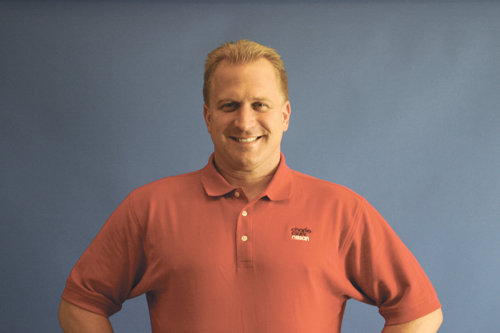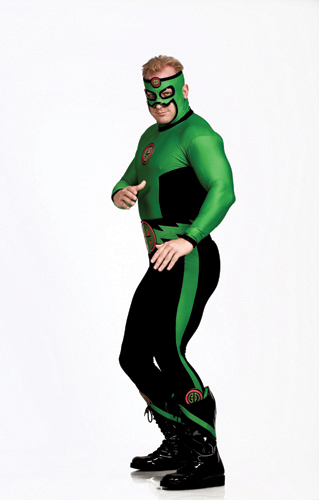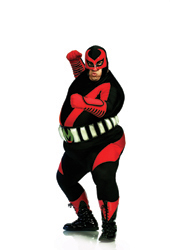|
Splash Page | Alumni profile | Notables

Harlingen hero
Charlie Clark '92 sells cars. But once a week he slips into bright green spandex and saves damsels in distress.

By Nancy Allison
Charlie Clark '92 is a big, strapping Texan. He looks like he could flip any car on his Nissan lot and buff its undercarriage for you, if that would close the deal. But the six-foot-two, 220-pound Clark saves his superhero tactics for TV: Spanish-language commercials and a sitcom with his Mexican nana (nanny).
At 86, nana Aurora Aguirre has been helping Clark sell cars for five years now. "She loves it," Clark said. "She was always a ham. In church plays she was always the star."
 She still is. In one commercial spot the little lady, who comes up to Clark's bicep, vouches for him: if you don't get a fair deal, she promises, slapping her palm, "Charlie will get a pau-pau" (a spanking). She still is. In one commercial spot the little lady, who comes up to Clark's bicep, vouches for him: if you don't get a fair deal, she promises, slapping her palm, "Charlie will get a pau-pau" (a spanking).
The two have struck a chord in Harlingen, a border town near Brownsville where the Latino population is 78.2 percent. Clark, who learned Spanish at Aguirre's knee, first spoke to customers in Spanish at his father's dealership in 1999.
"I could see that many customers were struggling to speak English. I shifted that around and began to struggle back — in Spanish. I hadn't used it since age 11, but I thought I could at least try and meet people halfway."
Clark's Spanish got better; customers told their friends. Sales soared.
In 2001, Clark bought a failing Nissan dealership in Harlingen. His first commercial in español was linguistically perfect, and yet he looked "so super-white and Anglo," that viewers thought it was dubbed. So Clark decided to introduce his nana in his next ad and explain how she'd taught him her language. Audiences loved her. And embraced the smiling, self-mocking, Spanish-speaking gringo as their own.
Soon, Clark began outselling rival dealerships in the area, even in nearby McAllen, where the Hispanic population is even larger than Harlingen's. But he didn't just enjoy his success: he capitalized on it.
In 2004, Orale Charlie! (Come on, Charlie!) began airing on local Spanish-language TV. Clark and Aguirre star in the half hour sitcom, which features Clark as "Charlie Nissan" transformed into Anglo superhero, Green Ghost. He and Latino superhero, Mexsican, (a.k.a. Marco Alvarez) patrol the border while getting up to a lot of silliness along the way. Aguirre stars as their guardian angel, enabling them to vanquish evil-doers.
Some think the show is rather childish, and Clark doesn't disagree: as a marketing man, he knows how much power children wield in the back seat of the car. Already using TV to link his dealership with "that blonde gringo who speaks Spanish," he decided to market to the whole family by aiming his sitcom at kids.
But Green Ghost is more than free marketing. The show (when the characters aren't speeding around on dirt roads) is filmed in a shed near the dealership using local acting and writing talent. Jokes and occasional blatant references to Nissan aside, scripts address major issues that affect the Hispanic community: drugs, gangs, immigration and diabetes.
So far, Clark has produced 30 episodes. Recently, he signed a contract with Neal Israel, executive producer of Finding Neverland, Police Academy, and Bachelor Party," for a Green Ghost pilot.
Clark doesn't know if the networks will take up the series or if it will be made into a movie, but he thinks it's a "fantastic concept: slapstick, funny, but real." Sort of like Clark, himself.
Underneath Green Ghost's green Lycra and self-deprecating humor is a deeply committed man. Clark bridges two languages and two cultures, both onscreen and off. In the sitcom, he and Mexsican speak English and Spanish interchangeably and give each other grief just like regular guys. They fight the good fight together. Who knows? They may even be doing something for Mexican-American relations.
 Clark certainly makes a good case for being bi-lingual. It's given him a thriving business, a possible TV series on major networks and a huge fan base. Who knew that speaking Spanish would open so many doors? Clark certainly makes a good case for being bi-lingual. It's given him a thriving business, a possible TV series on major networks and a huge fan base. Who knew that speaking Spanish would open so many doors?
"It really has been the biggest blessing of my life," said Clark. And he's not referring strictly to business. When asked which language he likes best, he quickly answers that he prefers to "practice" Spanish than speak English.
"I'm less inhibited when I speak Spanish, more expressive. I feel a bit more constrained in English; in Spanish, I'm more who I'd like to be. We all face problems and stress, but I find that the Spanish culture invites me to dive into the world more openly. I have more fun and less tension in Spanish."
Spanish is, after all, the language of Clark's childhood. "I spent half my life at the home of my Mexican nana when I was a kid." From Thursdays to Sundays at Aguirre's home, Clark was in a thoroughly Mexican environment: "Church, stores, the whole ballgame." In some ways, Clark has said, he feels closer to Aguirre than to his own parents.
From age 11 until he was 24 he didn't use Spanish, not even for an easy A in college. Clark always knew that his career would be in car sales. His family has owned dealerships in Texas since 1933. But he credits his time at TCU for curing his shyness. A marketing major who changed midstream to speech and communications, Clark was also on the swim team and a member of Sigma Alpha Epsilon. When assignments loomed, he practiced on his buddies.
"If you can take the ridicule of giving a speech in front of the swim team and your frat brothers, you can overcome anything. TCU was quite an influence on me and figured large in my professional life. It was there that I resolved my fear of sales and of being in front of a camera. Whenever I felt nervous in later life, I always referenced in my mind those speeches I gave at TCU."
Juan Guillermo Tornoe, marketing expert at Hispanic Trending in Austin, says that Clark has the "switch-hitter" personality that is so important in the job market these days. "Bi-lingual Latinos who can switch into Anglo-Saxon do themselves a favor." Clark is the rare Anglo who can switch into Latino mode.
It's much more than language skills. "You've got to connect with the community," said Tornoe. "Latinos have a more personal and playful attitude to business; Anglos get right down to work. Hispanics connect with who you are first. They establish a relationship before they sell you something."
Selling to Hispanics is no longer a luxury. They're the fastest growing ethnic community in the U.S. "It's a no-brainer: if you want to have a piece of the pie, you market now to Latinos," said Tornoe.
Funny thing is, Clark is a salesman doing something right, but he doesn't even seem to be trying. He started speaking Spanish in an attempt to relate to people, to make Latino customers feel comfortable. They appreciated his efforts, and business boomed.
"The biggest reward to me is not financial. It's in making a connection with people. I can't put a dollar amount on it. I don't want to.""

More at www.myspace.com/greenghostmexsican
Comment at tcumagazine@tcu.edu. |



